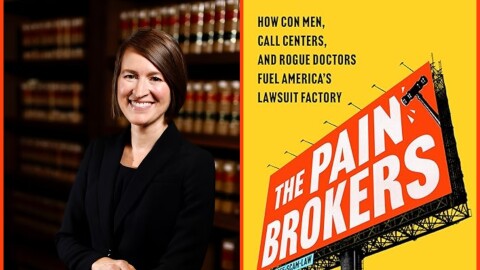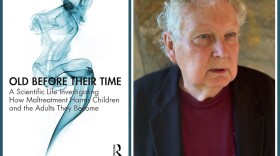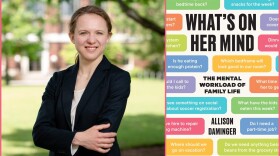-
On this week's 51%, we speak with Elizabeth Chamblee Burch, a professor at the University of Georgia School of Law, about her new book The Pain Brokers. Burch is a scholar of mass torts, the large civil lawsuits typically filed as a result of harmful products and recalls. Mass torts are meant to be an efficient way to provide relief to a large number of victims, but for thousands of women with pelvic mesh, Burch says that was not the case. The Pain Brokers investigates a complex scheme of call centers, doctors, and lawyers who Burch says preyed on pelvic mesh patients and used them to make millions off mass torts.
-
On this week's 51%, we speak with Elizabeth Chamblee Burch, a professor at the University of Georgia School of Law, about her new book The Pain Brokers. Burch is a scholar of mass torts, the large civil lawsuits typically filed as a result of harmful products and recalls. Mass torts are meant to be an efficient way to provide relief to a large number of victims, but for thousands of women with pelvic mesh, Burch says that was not the case. The Pain Brokers investigates a complex scheme of call centers, doctors, and lawyers who Burch says preyed on pelvic mesh patients and used them to make millions off mass torts.
-
Love isn't always easy, but how do you know when it's time to walk away? On this week's 51%, we speak with counselor Kate King about the difference between good relationships, bad relationships, and toxic ones. King boasts nearly 20 years of experience as a licensed counselor and board-certified art therapist in Denver, Colorado. Her latest book, called Mend or Move On, helps readers identify the traps of abusive relationships (romantic, familial, and platonic) and decide when to say goodbye.
-
On this week's 51%, we chat about The New Rules of Women's Health with veteran health journalist Meghan Rabbitt. For too long, Rabbitt says the broader medical field has limited conversations around women's health to "bikini medicine" — reproductive concerns and breast health — while otherwise assuming women have the same bodies as men. But women have their own unique health needs, and often experience diseases in different ways. Rabbitt's new guide compiles the knowledge of more than 130 medical experts to help women address all aspects of their health at any age.
-
On this week’s 51%, we speak with Kat Koppett, co-director of The Mopco Improv Theatre in Schenectady, New York and founder of Koppett, a consultancy company that uses improv to help businesses improve their workplace culture and collaboration. Koppett says the tools used in improvisational theater can apply to many aspects of our lives, including business. Koppett recently released a new edition of her 2001 book, Training to Imagine, with updated guidance and exercises for the modern workplace. Our associate producer, Madeleine Reynolds, also speaks with actress and singer Lea Salonga about her tour, “Stage Screen & Everything in Between.”
-
On this week's 51%, we speak with Dr. Frank Putnam, professor of clinical psychiatry at the University of North Carolina School of Medicine, about the Female Growth and Development Study (FGDS), which he co-founded with the late Dr. Penelope Trickett in 1987. The FGDS, which is still running today, has followed the lives of more than 100 girls to assess the impacts of child sex abuse on female development, and how trauma crosses generations. Putnam says child abuse can affect a survivor's physical and mental health in a way that accelerates their biological aging, putting them at an increased risk for early puberty, obesity, premature births, mental illness, cognitive decline and more. Putnam compiles more than 35 years' worth of papers from the FGDS — and outlines ways to better prevent child abuse — in his new book Old Before Their Time.
-
On this week's 51%, we speak with author and playwright Quiara Alegría Hudes about her debut novel, The White Hot. Hudes is the Pulitzer-Prize winning playwright of Water by the Spoonful and the musical In the Heights, which she also adapted for the screen. The White Hot takes the form of a letter written by a mom to her 18-year-old daughter, explaining — but not apologizing for — why she suddenly abandoned her nearly a decade prior. WAMC’s Sarah LaDuke speaks with Hudes about why she decided to write the tale, an unflinching exploration of one mom’s rage and journey toward self-discovery.
-
On this week's 51%, we look back on some of our favorite conversations from 2025: Dr. Heather Hirsch discusses the FDA’s decision to remove “black box” warning labels from hormonal therapies used to treat symptoms of menopause; Planned Parenthood President Alexis McGill Johnson explains how President Trump’s “One Big Beautiful Bill Act” blocks Medicaid funding for its clinics; and former CIA intelligence officer Christina Hillsberg makes the case for why women make better spies.
-
On this week's 51%, we speak with Emory University Professor Miriam Udel about how a 20th Century movement of Yiddish literature strived to help Jewish children make sense of a tumultuous world and shape the future of Jewish culture. Udel’s latest book on the subject — including how some Yiddish stories helped to promote equality for young girls — is Modern Jewish Worldmaking Through Yiddish Children’s Literature. We also speak with therapist Laurel van der Toorn about how to address “holiday burnout.”
-
On this week's 51%, we speak with Keene State College Professor Dr. Lisa DiGiovanni about "militarized masculinity," and the connection between authoritarianism, state violence, and misogyny. In her new book, Militarized Masculinity in Spain and Chile, DiGiovanni outlines how hyper-masculinity and the idolization of the military contributed to the rise of Spanish Dictator Francisco Franco in the 1930s and Chilean Dictator Augusto Pinochet in the 1970s. In both cases, DiGiovanni says backlash to social progress for women and minorities helped catapult these men to power. She also examines how the arts were used to resist or expose these regimes in their later years, and lays out the warning signs that other countries, including the U.S., should watch for.
-
The Food & Drug Administration recently decided to remove "black box" warnings from the packaging of hormonal therapies used to treat symptoms of menopause. On this week's 51%, we speak with internist Dr. Heather Hirsch, founder of the Menopause Clinic at Brigham and Women’s Hospital in Massachusetts, about the change. We also dive into Dr. Hirsch's new book, The Perimenopause Survival Guide, and discuss how to recognize what she calls the “evil little sister” of menopause and start treatment early.
-
On this week's 51%, we speak with Allison Daminger, professor of sociology at the University of Wisconsin, about her research into "cognitive" household labor, and how couples divvy up the planning, scheduling, and decision-making that goes into raising children and keeping a home. Daminger found that women were more likely to carry the brunt of cognitive labor in heterosexual relationships — even among egalitarian couples, and even if their partners worked as literal project managers at the office. Daminger explores why this is and compiles her research in her new book, What’s on Her Mind: The Mental Workload of Family Life.














